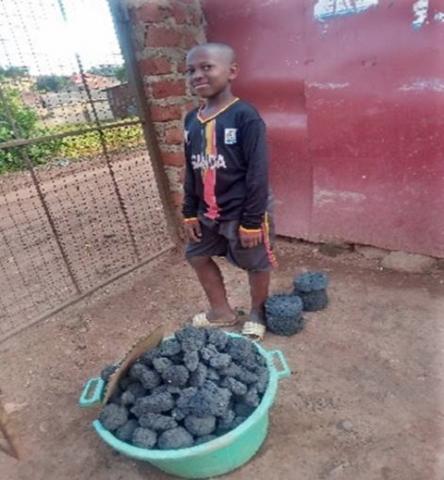13-year-old Kileti using briquettes to save environment By Tino Deborah

Keleti with the briquettes he made
Ahimbisibwe Keleti completed his Primary Leaving Examinations recently. The 13-year-old has quickly thought about how to keep himself busy as he waits to graduate to the next level of education. Keleti has been owning a piggy bank, where he would put his savings from money he would get from his mother. He is now investing the money, so he earns more profits. Charcoal briquettes is where Keleti has made his investment. From what he has so far reaped, he seems to be happy with the decision.
One day, Keleti decided to make three briquettes for a start, by mixing glue, charcoal dust, locally called lusenyete and clay soil. When he used the product of the mixture – briquettes – he realised that they were lighting for a longer time than charcoal.
Keleti, therefore, used his savings to buy a bag of charcoal dust, at sh5,000, sugar glue at sh2,000 and clay soil at sh10,000. He also added cassava flour, which he uses as glue. From that purchase, he was able to make more briquettes, which he is now selling. Keleti, who sells seven briquettes at sh1,000, hopes to open his own stall selling only briquettes. The
use of briquettes should be a welcome idea because they are cleaner and cheaper, options that the community should be comfortable with, especially during the lockdown occasioned by the increasing spread of the coronavirus.
Keleti is directly saving the environment through his business. Wood charcoal is the most commonly used fuel in the country. Statistics have indicated that wood fuel is partly responsible for the large scale deforestation in the country. The briquettes that Keleti makes produce clean energy. But that’s not all. The use of briquettes means that less trees will be
cut to make charcoal, and there will be lower emissions of greenhouse gases, hence helping to mitigate climate change.
By Tino Deborah
Community Journalist
